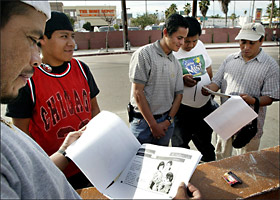 |
 |
 |
 Entertainment | Books | February 2005 Entertainment | Books | February 2005  
The Everymigrant's Guide to Crossing the Border Illegally
 Charlie Leduff and J. Emilio Flores Charlie Leduff and J. Emilio Flores

When the desert is cool, as it is now, illegal immigration becomes a flood.

 Of the million people who were arrested trying to sneak into the United States over the Mexican border last year, more than half were caught from January to April, the United States Border Patrol says. Of the million people who were arrested trying to sneak into the United States over the Mexican border last year, more than half were caught from January to April, the United States Border Patrol says.

To avoid detection, smugglers now lead people through more demanding and dangerous terrain; more than 300 people died trying to cross last year.

To help prevent death and deportation, the Mexican government has published a guide that advises its citizens on the intricacies of sneaking into the United States. It also gives tips on how migrants should conduct themselves after reaching the streets of the promised land.

The 31-page pamphlet, "Guide for the Mexican Migrant," has infuriated some American politicians and citizens who say the Mexican government is effectively encouraging a criminal activity that is fraying the American cultural fabric and draining state and local municipalities.

The Mexican government says it is simply recognizing reality.

Many illegal immigrants living in Los Angeles said they had heard about the booklet, but few had actually seen it. A group of Latino men waiting for work outside the Home Depot superstore on Sunset Boulevard were offered copies of the booklet by a reporter. They freely admitted that they were in the United States illegally. That said, the men flipped through the booklet for a few minutes before dismissing the effort of the Mexican government.

"Useless," said Jorge Castillo, 30, a Guatemalan who has made the desert trek seven times in seven years.

"Trash," said Efraํn Travolia, 35, a Mexican who speaks a little English.

These men and a dozen others milling about offered a portrait of the trip and practical advice on how to make it and how to live upon arrival in Los Angeles.

The booklet warns the migrant that if he decides to use the services of a smuggler, he should not hand his children over to him, not carry packages or drive a vehicle for him, as they may contain drugs, and not trust his assurances.

There is better advice that may save your life, the men said.

"Never hire a coyote on the border," said Mr. Castillo, a thickly built man with whiskers and gold teeth, referring to the smugglers who guide illegal migrants into the United States. Have a friend recommend a contractor while you are in your hometown, he advised. "This way, if anything happens to you, your family knows his family."

Those who hire strangers at the border are more likely to be robbed, raped or held for ransom, Mr. Castillo said. It should not cost more than $2,000, he said, to go from the Mexican side of the border to Phoenix.

Once migrants are taken to Phoenix, the men said, they are locked in "safe houses" until they call loved ones who wire money to the smugglers. The enterprise works on a cash-on-delivery basis. Migrants should be sure to have a code word so that if things are going badly, their loved ones can intervene by going to the family of the smuggler back at home, ensuring the migrant's safety and release, Mr. Castillo said.

"If immigration catches you, never give the name of the coyote," cautioned Mr. Travolia, who said he had on occasion smuggled people over the border himself. "You might end up dead or in prison."

Mr. Travolia told of a woman who informed on a smuggler to United States immigration officials. The smuggler then told officials that she was his partner. "She is sitting in jail right now," Mr. Travolia said.

Crossing a river can be risky, the Mexican government guide says: "Heavy clothing grows heavier when wet, and this makes it difficult to swim or float."

Mr. Travolia, who is from Guadalajara, advised: "Try never to cross the river. Never do it. If you have to, write your name in your underpants in case you drown. Then they can find your family and you can be buried by a priest."

Mr. Castillo said that if migrants made it as far as an American river, that was not the time to be cheap.

"Spend the $5 for an inner tube," he said. | 
 | |
 |



